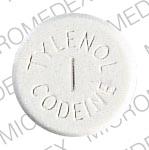Tylenol with Codeine #1 Interactions
There are 616 drugs known to interact with Tylenol with Codeine #1 (acetaminophen / codeine), along with 19 disease interactions, and 1 alcohol/food interaction. Of the total drug interactions, 132 are major, 471 are moderate, and 13 are minor.
- View all 616 medications that may interact with Tylenol with Codeine #1
- View Tylenol with Codeine #1 alcohol/food interactions (1)
- View Tylenol with Codeine #1 disease interactions (19)
Most frequently checked interactions
View interaction reports for Tylenol with Codeine #1 (acetaminophen / codeine) and the medicines listed below.
- acetaminophen
- amitriptyline
- amlodipine
- amoxicillin
- baclofen
- Benadryl (diphenhydramine)
- calcium citrate
- cannabis
- celecoxib
- cetirizine
- cyclobenzaprine
- diclofenac
- gabapentin
- ibuprofen
- magnesium citrate
- magnesium glycinate
- melatonin
- metoclopramide
- multivitamin
- prednisone
- pregabalin
- Robaxin (methocarbamol)
- sumatriptan
- Symbicort (budesonide / formoterol)
- trazodone
- Tylenol (acetaminophen)
- Tylenol Extra Strength (acetaminophen)
- Vitamin C (ascorbic acid)
- Vitamin D3 (cholecalciferol)
- Zofran (ondansetron)
Tylenol with Codeine #1 alcohol/food interactions
There is 1 alcohol/food interaction with Tylenol with Codeine #1 (acetaminophen / codeine).
Tylenol with Codeine #1 disease interactions
There are 19 disease interactions with Tylenol with Codeine #1 (acetaminophen / codeine) which include:
- alcoholism
- liver disease
- impaired GI motility
- infectious diarrhea
- prematurity
- acute alcohol intoxication
- drug dependence
- hypotension
- intracranial pressure
- respiratory depression
- gastrointestinal obstruction
- PKU
- adrenal insufficiency
- liver disease
- renal dysfunction
- seizure disorders
- urinary retention
- arrhythmias
- biliary tract disease
More about Tylenol with Codeine #1 (acetaminophen / codeine)
Drug Interaction Classification
| Highly clinically significant. Avoid combinations; the risk of the interaction outweighs the benefit. | |
| Moderately clinically significant. Usually avoid combinations; use it only under special circumstances. | |
| Minimally clinically significant. Minimize risk; assess risk and consider an alternative drug, take steps to circumvent the interaction risk and/or institute a monitoring plan. | |
| No interaction information available. |
See also:
Further information
Always consult your healthcare provider to ensure the information displayed on this page applies to your personal circumstances.


